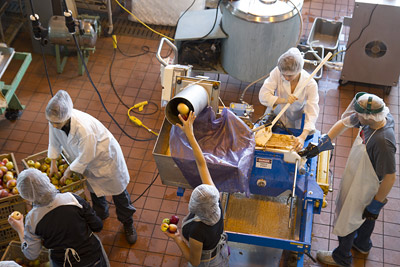Cider fundraiser presses on despite smaller harvest
By Kate Frazer

This year's smaller apple crop didn't stop graduate students from continuing a favorite fall tradition at the New York State Agricultural Experiment Station (NYSAES): using apples from the station's field trials and breeding programs to press cider, and selling that cider to fund scholarships for high school seniors.
"We use different varieties depending on the year," said Erik Smith, a graduate student and member of the Student Association of the Geneva Experiment Station (SAGES). "Our main varieties this season were Empire and Crispin. Empires are quite sweet while Crispin tend to be more acidic, so combining the two makes for a nice balance of flavors."
The student-made cider has become a popular autumn offering at NYSAES, and the students' biggest concern this year was making enough to meet the demand.
"The unusual spring weather did affect the crop," said Smith. "There weren't as many apples, and the quality of those we had to pick from wasn't what it usually is." But thanks to donations from the programs of Kerik Cox, associate professor of plant pathology, and Herb Cooley, food science technician, the students stockpiled enough for the year's pressings.
One thing that sets the students' cider apart is how fully local it is. Not only are the apples grown and harvested at NYSAES, but some of the varieties used were first developed by Cornell apple breeders. The Empire apple, developed in 1966, is one of 66 Cornell-developed varieties and one of the most successful varieties ever released by the station.
Cider on sale
Cider from the Nov. 15 pressing is now available. The price is $4 for a half gallon or $7 for two half gallons. Contact Lauren at lem248@cornell.edu to order in bulk for $7 a gallon. Cider will be available for purchase outside the Food Science pilot plant and in the lobby of Barton Hall, 738 Castle St., Geneva, N.Y.
Even the pasteurization process is homegrown. The ultraviolet pasteurization technique the students use was developed at NYSAES by Randy Worobo, associate professor of food microbiology, and his lab members as an alternative to thermal pasteurization.
"UV pasteurization doesn't affect taste like heat pasteurization does," Smith said. "Apple cider is meant to taste like fresh apples, not boiled apples."
Smith explained that the cider fundraiser was launched in 2007 without a specific goal: "At that point, all the group knew was that they wanted to support a cause in line with the SAGES' mission of engaging NYSAES with surrounding communities in a positive way."
They eventually created the SAGES Advancement of Agricultural Studies Scholarship program for area students with agricultural interests from traditional farming to plant pathology to journalism. They first solicited applicants from Geneva and DeSales high schools and expanded the program to include applicants from Marcus Whitman, Midlakes, Penn Yan, Romulus, South Seneca, Trumansburg, Waterloo and Ithaca high schools.
They support the program with fundraisers throughout the year -- from the cider pressing to jam-making and a pumpkin-growing contest.
Seven high school seniors have received awards. The spring's recipients were Sean Murphy of Penn Yan Academy, who began studying plant science at Finger Lakes Community College this fall, and Katrina Amberg of Geneva High School, who is studying veterinarian medicine at Cornell.
"For me, this is a way of giving back to the community," said Smith. "Most of us are studying in Geneva for only a short time, but we want to be able to call it home. Since so much of the region's economy depends on agriculture, we've decided to lend a hand to students who've chosen agriculture as a career. Plus, our cider tastes great."
At the October pressing, the first of three planned for this fall and winter, students pressed about 20 bushels of apples, and they'll press about 60 more bushels by the time the season is through. They hope to sell more than 160 gallons and raise $1,200 for the scholarship fund.
Kate Frazer is the agricultural experiment stations communications officer at the College of Agriculture and Life Sciences.
Media Contact
Get Cornell news delivered right to your inbox.
Subscribe